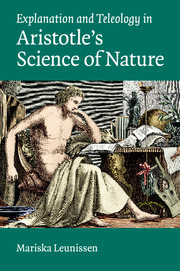Book contents
- Frontmatter
- Contents
- List of figure and tables
- Acknowledgements
- List of abbreviations
- Introduction
- 1 Aristotle's defense of natural teleology: setting the stage for teleological explanations in the Physica
- 2 Aristotle's bio-functional account of the soul: establishing the starting points of teleological explanation in the De Anima
- 3 Introducing biology as a demonstrative science: the theory of teleological explanation in the De Partibus Animalium I
- 4 Explaining parts of animals: the practice of teleological explanation in the De Partibus Animalium II–IV
- 5 Making sense of the heavens: the limits of teleological explanation in the De Caelo
- 6 Aristotle's model of science: formalizing teleological explanations in the Analytica Posteriora
- 7 Conclusion
- Bibliography
- General index
- Index locorum
6 - Aristotle's model of science: formalizing teleological explanations in the Analytica Posteriora
Published online by Cambridge University Press: 07 September 2010
- Frontmatter
- Contents
- List of figure and tables
- Acknowledgements
- List of abbreviations
- Introduction
- 1 Aristotle's defense of natural teleology: setting the stage for teleological explanations in the Physica
- 2 Aristotle's bio-functional account of the soul: establishing the starting points of teleological explanation in the De Anima
- 3 Introducing biology as a demonstrative science: the theory of teleological explanation in the De Partibus Animalium I
- 4 Explaining parts of animals: the practice of teleological explanation in the De Partibus Animalium II–IV
- 5 Making sense of the heavens: the limits of teleological explanation in the De Caelo
- 6 Aristotle's model of science: formalizing teleological explanations in the Analytica Posteriora
- 7 Conclusion
- Bibliography
- General index
- Index locorum
Summary
INTRODUCTION
In the Analytica Posteriora, Aristotle defines scientific knowledge as knowledge of the reason why. Knowing why something is the case amounts to being able to provide a scientific demonstration (apodeixis), which consists in a valid syllogistic argument in the mode Barbara (i.e., AaB, BaC, ∴ AaC). Such demonstrations typically deduce the necessity of an attribute belonging per se to a certain subject through a middle term that picks out the cause of that necessary relationship. Thus, if formalized in accordance with the recommendations of the Analytica Posteriora, causal explanations (i.e., linguistic expressions that identify the cause of some phenomenon) will constitute scientific demonstrations. However, despite the long tradition of Aristotelian scholarship on this treatise, many details concerning the precise nature and syllogistic structure of demonstration remain enigmatic, and are subject of much controversy.1
In this chapter, I aim to shed light on Aristotle's pivotal discussion of the integration of the four types of causal explanation into the syllogistic framework of demonstration in APo II.11, and specifically on his suggestions on how to formalize teleological explanations. In the first part of this chapter (sections 6.1–6.3), I shall clarify the examples Aristotle provides to illustrate his theoretical remarks about how to formalize causal explanations into the syllogistic structure of scientific demonstration. In particular, I hope to make sense of the teleological example of walking after dinner for the sake of health.
- Type
- Chapter
- Information
- Explanation and Teleology in Aristotle's Science of Nature , pp. 176 - 207Publisher: Cambridge University PressPrint publication year: 2010



